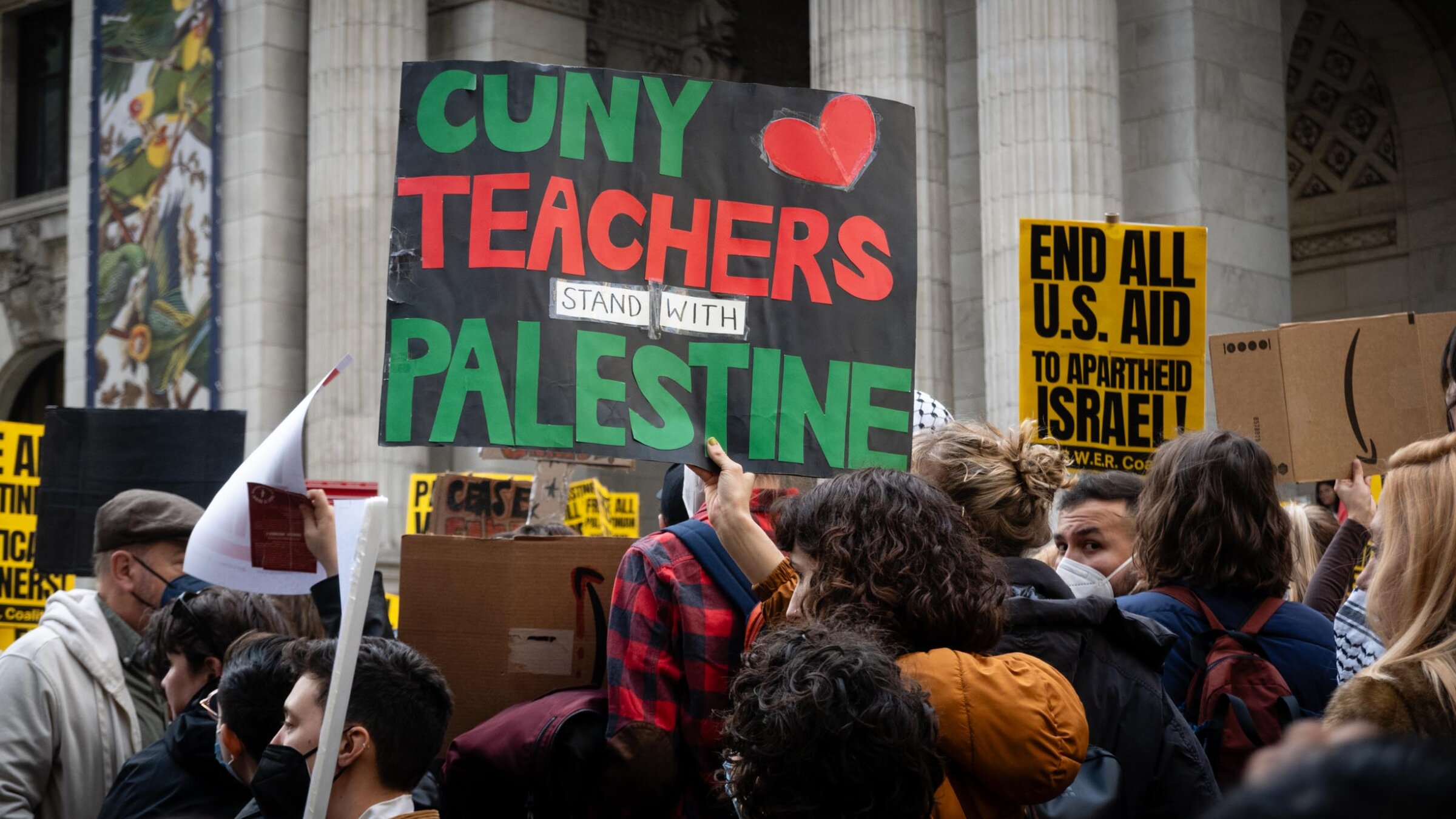Despite string of pro-Palestinian statements, CUNY faculty union rejects Israel boycott
he Professional Staff Congress’ delegate assembly rejected a wide-ranging anti-Israel measure by a vote of 117 to 40

Pro-Palestinian demonstrators at a rally near Bryant Park, November 9, 2023. (Luke Tress)
Three years after voting to “consider” boycotting Israel, and weeks after defending a pro-Palestinian student encampment, the faculty union of the City University of New York overwhelmingly rejected a resolution calling for an Israel boycott.
The union’s president actively opposed the resolution, saying that it inappropriately singled out Israel. But insiders say the Professional Staff Congress’ rejection may have had more to do with the union’s salary negotiations than any principled view about the Israel-Hamas war, which has roiled the CUNY system.
The resolution called for the university system to carry out a number of steps that anti-Israel protesters have called for at CUNY and dozens of other colleges and universities across the country this spring.
“Ban all academic trips to the Zionist state, encompassing birthright, Fulbright, and perspectives trips,” the proposal said. “Cancel all forms of cooperation with Israeli academic institutions, including events, activities, agreements, and research collaborations.”
The measure, called Resolution in Support of CUNY Gaza Solidarity Encampment, also demanded that CUNY divest from all “companies complicit in the imperialist-zionist genocide” as well as for full transparency regarding CUNY’s investments.
The resolution also called for the NYPD, which arrested dozens of people when dismantling City College’s encampment weeks ago, to be banned from campus. It called on CUNY to reinstate professors fired for anti-Israel activism — though it did not specify who it was referring to.
The resolution endorsed a Palestinian right of return to Israel, which many Israelis view as tantamount to the end of Jewish sovereignty in Israel. And it called for a “fully-funded, free CUNY that is not beholden to zionist and imperialist private donors.”
The union’s 300-member delegate assembly, its central policy-making body, rejected the resolution by a vote of 117 to 40, according to a spokesperson.
Manfred Philipp, a former member of the delegate assembly who has maintained ties to the union, said he believes the resolution was voted down because it would have been detrimental to the PSC’s interests, not because of union members’ views on the conflict. The union has an obligation to negotiate salary contracts for its members, and the anti-Israel resolution could have hurt the union’s chances of securing a salary increase from city and state lawmakers who are sympathetic to Israel, Philipp said.
“The basis of the opposition to the resolution has nothing to do with the situation in the Middle East. It has everything to do with the interests of the union and the university,” said Philipp, who taught at CUNY’s Lehman College for decades before retiring around a decade ago.
“The union’s self-interest says they should not take a position on this at all,” he said, adding that he supported the result of the vote.
The PSC says it represents 30,000 faculty and staff across CUNY’s 25 colleges. Its delegate assembly includes representatives from each college’s chapter and the 27 general officers in the union’s executive council.
Ahead of the vote, union president James Davis sent an email to the delegate assembly opposing the resolution, saying the measure had been rushed through without proper input from union members, and that it only targeted Israeli universities, not “universities in countries engaged in serial human rights abuses or committing genocide, a singularity that many of our colleagues would find objectionable.”
Earlier this month, the union condemned a pro-Palestinian strike by its own members. But previously, it has taken pro-Palestinian positions and has drawn accusations of discrimination from Jewish faculty. In recent weeks, the PSC demanded charges be dropped against protesters at the pro-Palestinian encampment, condemned police action against protesters and backed protesters at Columbia University.
A group of Jewish professors sued the PSC in 2022 after the union adopted a resolution criticizing Israel the previous year, calling it discriminatory. A judge dismissed the case. Dozens of Jewish professors resigned from the union due to the resolution.
That 2021 resolution also called to consider union support for the Boycott, Divestment and Sanctions movement targeting Israel.
A 2016 state executive order bars state agencies from anti-Israel boycotts, meaning that a boycott could come with financial consequences for the CUNY system. But the faculty union does not set policy for the system.
CUNY has long faced allegations of antisemitism on its campuses. The university system, the nation’s largest urban college network with more than 225,000 students, has come under fire in recent years from city and state lawmakers for reported discrimination against Jewish students.
Last year, weeks after Hamas’ Oct. 7 attack on Israel, New York Gov. Kathy Hochul ordered a third-party investigation into antisemitism at CUNY.
The system has been a hotspot for anti-Israel protests since then. In March, Hunter College opened an investigation after protesters chanted that Jews at the school needed to “pick a side.” Earlier this month, two CUNY campuses nixed Jewish events due to protests.
CUNY has taken steps to address antisemitism on its campuses, including by setting up an advisory council on Jewish life and partnering with Manhattan’s Museum of Jewish Heritage to educate students about the Holocaust.
This article originally appeared on JTA.org.















